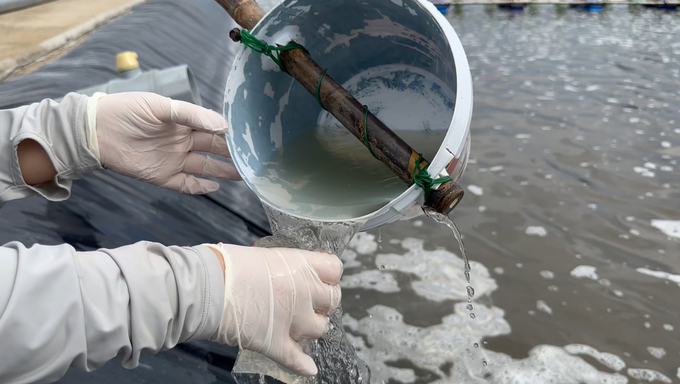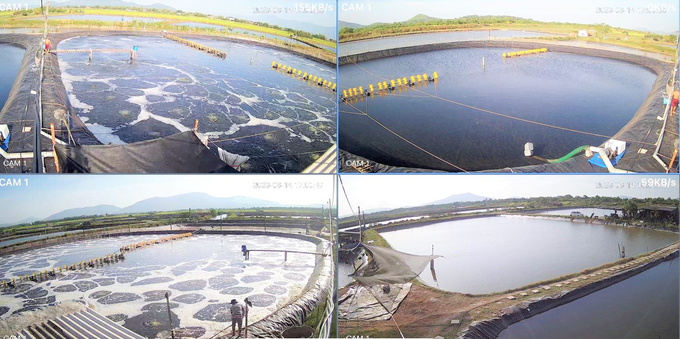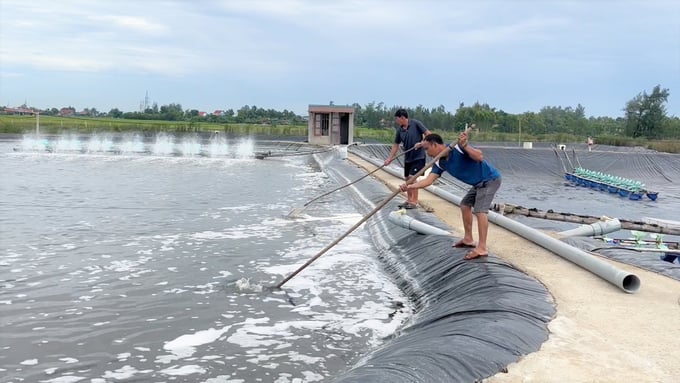June 15, 2025 | 05:02 GMT +7
June 15, 2025 | 05:02 GMT +7
Hotline: 0913.378.918
June 15, 2025 | 05:02 GMT +7
Hotline: 0913.378.918

In 2023, disease in shrimp shows a 44% decrease compared to 2022. Photo: Thanh Nga.
Implementing the Scheme to restructure the agricultural sector in the 2021 - 2025 period, vision to 2030, Ha Tinh province identifies shrimp as a key farming species and an item with advantages in commodity-oriented development, but on the path of sustainable shrimp farming, disease and environment remain the two factors that the industry needs to ensure.
There were times when people in coastal areas such as Nghi Xuan, Thach Ha, and Cam Xuyen rushed to raise shrimp on the sand. Many farms invested VND 3 - 4 billion, even tens of billions of VND, but could only successfully raise the first 1 to 2 crops, then epidemics came. People gradually abandoned the ponds. It was partly due to weather, climate, and soil, but the main reason for this failure was still the lack of expertise and awareness of farmers in environmental protection and disease prevention.
In the past 5 years, shrimp farming technology has progressively developed, creating conditions for people to confidently switch from extensive farming and improved farming to intensive farming and high-tech intensive farming.
This change is one of the prerequisite solutions, contributing to minimizing water pollution and dangerous infectious diseases such as white spot, acute hepatopancreatic necrosis disease (AHPND), and enterocytozoon hepatopenaei (EHP).

Regular monitoring of water sources in farming areas has provided early warning, which helps farmers proactively prevent shrimp diseases. Photo: Thanh Nga.
According to Dang Thi Thu Hoan, Deputy Director of Ha Tinh Sub-department of Livestock Production and Animal Health, the whole province raises 2,239 ha of shrimp in 2023 but only 50 ha is infected with white spot diseases (more than 41 ha); acute hepatopancreatic necrosis (3.6 ha) and enterocytozoon hepatopenaei (nearly 5 ha). Diseased areas are concentrated in Ky Anh, Cam Xuyen, Thach Ha, Loc Ha, Nghi Xuan districts, Ky Anh town and Ha Tinh city.
“There are many factors that impact the effectiveness of disease prevention work in shrimp, but the community has had big contributions in minimizing damage caused by epidemics. In particular, farmers have proactively invested in farming area infrastructure, and specialized agencies are timely in terms of monitoring, warning, and handling of narrow-area outbreaks," Deputy Director Hoan said.

Making investments to convert from extensive shrimp farming to high-tech intensive farming not only creates a favorable environment for shrimp to grow but also limits the appearance of viral diseases in ponds. Photo: Thanh Nga.
On May 4, 2023, the white spot disease appeared in the shrimp farming area of 13 households in Bac Son Hai, Bac Hai villages in Ky Hai commune (Ky Anh district), killing 830,000 shrimp in an area of nearly 9 ha.
Immediately after determining that the shrimp sample was positive for the white spot disease, the Center for Application of Science, Technology and Protection of Plants and Animals of Ky Anh district coordinated with the provincial Sub-department of Livestock Production and Animal Health to quickly guide farmers to destroy diseased ponds.
“Thanks to timely having the white spot epidemic under control in the spring - summer crop and ensuring pond renovation, in the recent fall - winter shrimp crop, all 9/9 ha of shrimp farm of the people in Ky Hai commune come out victorious. Some households even earn billions of VND in profit," said the head of Ky Hai commune.
If it was in the past when high-tech intensive shrimp farming was only applicable in sand-based farming areas with favorable conditions such as Cam Xuyen and Nghi Xuan districts, now in earthen pond farming areas, pond owners in Mai Phu commune, Ho Do (Loc Ha district), Ky Ha and Ky Thu communes (Ky Anh district) have also boldly deployed new technologies.

Although shrimp prices are quite low, this year the majority of shrimp farmers still earn high profits. Photo: Thanh Nga.
There are many organizations and individuals in Ha Tinh investing in intensive shrimp farming in tidal flat earthen ponds, high-tech farming on sand, achieving productivity of 10 - 15 tons/ha/crop in earthen ponds and 20 - 30 tons/ha/crop in high-tech ponds on sand.
Other farmers improve ponds by spreading tarpaulin, covering the bank with stone powder and aerating the bottom. Some people choose to raise shrimp in closed houses or net houses and replicate intensive shrimp farming models following VietGAP direction. This contributes to increasing Ha Tinh’s total area of intensive and high-tech shrimp farming to 629 ha, promoting production in the form of cooperation and association throughout the province.
Translated by Samuel Pham
![Turning wind and rain into action: [4] Bringing climate bulletins to remote and isolated areas](https://t.ex-cdn.com/nongnghiepmoitruong.vn/608w/files/linhnhp/2025/06/14/1152-z6704423696987_15fd32ffc26d590d204d520c9dac6786-nongnghiep-151141.jpg)
(VAN) The Vietnam Agriculture and Nature Newspaper interviewed Mr. Vu Thai Truong, Acting Head of Climate Change and Environment at UNDP Vietnam, to gain deeper insight into how climate bulletins are delivered to farmers.

(VAN) In Tien Giang, a high-tech shrimp farm has developed a distinctive energy-saving farming model that has yielded promising results.
![Turning wind and rain into action: [3] 300.000 farmers benefit from agro-climatic bulletins](https://t.ex-cdn.com/nongnghiepmoitruong.vn/608w/files/news/2025/06/12/e5a48259d6a262fc3bb3-nongnghiep-125122.jpg)
(VAN) The agro-climatic bulletin has become a valuable tool for farmers in the Mekong Delta. After more than five years of implementation, the initiative is gradually being expanded nationwide.
![Turning wind and rain into action: [2] Providing forecasts to the people](https://t.ex-cdn.com/nongnghiepmoitruong.vn/608w/files/news/2025/06/12/e5a48259d6a262fc3bb3-nongnghiep-103927.jpg)
(VAN) In addition to improving the quality of hydrometeorological forecasts, putting forecast bulletins into practical use is crucial for production and disaster prevention.

(VAN) Blue carbon is receiving attention for its rapid absorption capacity and vast potential. It represents a promising nature-based solution to respond to climate change.
/2025/06/11/3507-1-161904_583.jpg)
(VAN) Seagrass beds and coral reefs serve as 'cradles' that nurture life in the ocean depths, creating rich aquatic resources in Vietnamese waters.
![Turning wind and rain into action: [1] Forecasting for farmers](https://t.ex-cdn.com/nongnghiepmoitruong.vn/608w/files/news/2025/06/11/e5a48259d6a262fc3bb3-nongnghiep-111919.jpg)
(VAN) Weather is no longer just a matter of fate. Forecasts have now become an essential companion for farmers in every crop season.